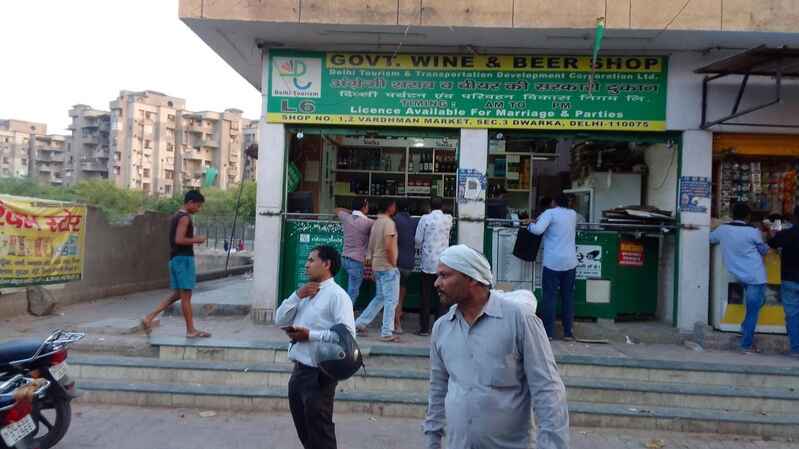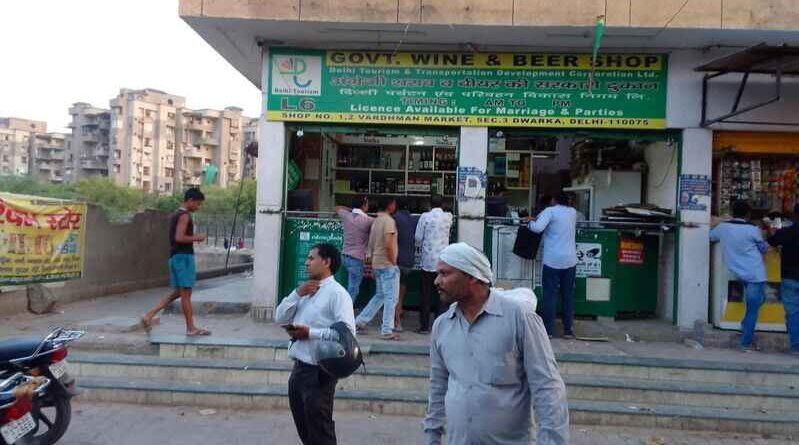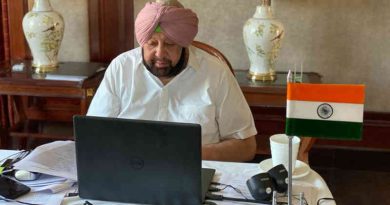CAG Report Reveals Corruption in Delhi Liquor Scandal of Kejriwal’s Aam Aadmi Party

CAG Report Reveals Corruption in Delhi Liquor Scandal of Kejriwal’s Aam Aadmi Party
If the courts and investigating agencies probe all the cases diligently, it is possible that Kejriwal and many other AAP leaders will have to spend their remaining lives in jail.
By Rakesh Raman
A new report released by the Comptroller and Auditor General (CAG) of India has revealed a revenue loss of Rs 2,027 crore for the government because of financial irregularities in the implementation of now-scrapped Delhi’s liquor policy in 2021-22.
According to an India Today report of January 11, 2025, the CAG report has found various lapses, violations of policy norms, felonious decisions to favour certain liquor vendors, and arbitrary distribution of licenses to sell liquor in the city.
The report adds that in order to favour certain business entities with dubious financial records, the Aam Aadmi Party (AAP) of then-chief minister (CM) and AAP leader Arvind Kejriwal got kickbacks or bribes from the liquor vendors.
The CAG report further reveals that the decisions to implement the liquor policy by the AAP government were taken without the mandatory Cabinet approval or clearance from the Lt. Governor (LG) of Delhi. Moreover, with the aim to implement the shady liquor policy, the AAP government did not present the revised rules in the Delhi Assembly for ratification an thus deliberately breached constitutional protocols.
DELHI LIQUOR SCANDAL INVESTIGATION
A Delhi court had sent Kejriwal to judicial custody for 14 days – till July 12, 2024 – in connection with corruption charges in the Delhi liquor policy case. While Kejriwal was already in jail, the Central Bureau of Investigation (CBI) had arrested him on June 26 to interrogate him. After 3 days of custody, today (June 29) Kejriwal was sent for 14 more days to jail on CBI’s plea.
Kejriwal was arrested on March 21, 2024 by the Enforcement Directorate (ED) for his alleged involvement in the liquor policy scandal. Kejriwal was arrested and sent to Delhi’s Tihar jail after he defied nine summonses of ED which had been calling him for questioning in the money laundering crime linked with Delhi liquor policy scam.
With his repeated refusals to appear before the ED, Kejriwal showed that he wants to hide his criminal acts and obstructed the delivery of justice – which by itself is a crime committed by Kejriwal.
Moreover, the ED claims that it has shown sufficient evidence to the courts to prove Kejriwal’s involvement in Delhi liquor policy scam, while his other colleagues – including former deputy CM Manish Sisodia and AAP Rajya Sabha member Sanjay Singh – were also jailed in this case.
In October 2023, while rejecting the bail application of Sisodia, the Supreme Court had said there is a possible embezzlement of Rs. 338 crore in the liquor scam case. But the embezzled money has not yet been recovered.
The Delhi liquor scandal case has been covered thoroughly in the “India Corruption Research Report 2024”. You can click here to download and read the research report.
CIRCUMSTANTIAL EVIDENCE
In fact, in such cases of white-collar financial crimes, the recovery of money is not essential to prove a crime. Rather, only circumstantial evidence is required to arrest and incarcerate the accused. And there is sufficient circumstantial evidence to prove Kejriwal’s involvement in the Delhi liquor scam in which hundreds of crores of rupees have been embezzled.
For example, in the new liquor policy that Kejriwal approved, the profit margin for wholesalers was increased arbitrarily from 5% to 12% so that a part of this commission money (allegedly half of the commission) could come back to Kejriwal and AAP in the form of kickbacks.
While the new policy was supposed to benefit the state government, like the CAG the ED also asserts it resulted in a loss of Rs. 2,631 crore to the public exchequer. In other words, the increased money was siphoned off by Kejriwal and AAP instead of depositing it to the state exchequer.
The ED had arrested Kejriwal – who according to ED is the “kingpin” or the key conspirator in the liquor scandal. The ED alleged that Kejriwal is part of a conspiracy to deliberately leave loopholes in the now-scrapped Delhi excise policy for 2021-22 to benefit certain liquor sellers.
As a result of the dubious excise policy for liquor sales, the state’s revenue dropped to Rs 3,700 crore from Rs 6,300 crore in the previous year, although the Kejriwal government had asserted that the revenue earning will increase to Rs 9,000 crore.
This loss to the state exchequer is a major corruption crime which falls under the grand corruption and rent-seeking categories of white-collar financial crimes in which direct or physical evidence is not required.
In a startling revelation, the ED also revealed that with the aim to destroy evidence, 140 mobile phones were changed by over 30 persons allegedly involved in the liquor scam of Delhi. It is learnt that Kejriwal also did not give access to his phone to the investigating agencies.
Obviously, the attempt to change the liquor policy with the intention to cause a loss to the state exchequer – and with the possibility of misappropriation of public money – is a very strong circumstantial evidence against Kejriwal and other AAP politicians.
The destruction of digital evidence is also an obstruction of justice offence for which Kejriwal and his accomplices should not have been granted bail. But in September 2024, the Supreme Court of India granted bail to Kejriwal with a dubious judgment when he had spent almost 5 months in jail. Similarly, after 17 months of incarceration the top court granted bail to Sisodia also in August 2024.
In this liquor scandal case, another AAP leader Sanjay Singh was also granted bail by the Supreme Court in April 2024 and released from jail, although his involvement in the liquor policy case is quite visible.
Actually, Kejriwal, Sisodia, and Sanjay Singh did not pass the triple test for bail, but the court judges – who are usually influenced by some extraneous factors – have been giving bails to these influential politicians.
The corruption in the Supreme Court and other courts of India is explained thoroughly in the “India Judicial Research Report 2024: Decline of the Indian Judiciary”. You can click here to download and study the research report.
The triple test or the tripod test (1. flight risk, 2. influencing witnesses, and 3. tampering with evidence) for bail expects the prisoner to satisfy the court that he / she will not flee the country, will not influence the witnesses, and will not tamper with the evidence.
However, their records show that these AAP leaders do not pass the triple test for bail. It is alleged that Kejriwal and Sisodia have tampered with the evidence by destroying their mobile phones or not providing their access to the investigating agencies. After release from jail, Sanjay Singh is openly accusing the agencies and the government to subtly influence the witnesses as well as the courts.
It is also alleged that the AAP leaders have tried to gain access to the documents related to the liquor policy with the intention to tamper with the evidence. Moreover, with their money and muscle power the AAP politicians can easily influence the witnesses linked with the liquor scam. Kejriwal also does not pass the triple test for bail, because he defied nine ED summonses which called him for questioning in this case.
As the court has released Kejriwal and his accomplices, they can make more attempts to destroy the evidence and influence the witnesses by intimidation or allurement.
COURT JUDGMENT AND AAP CASES
Earlier, with a controversial judgment, Judge Niyay Bindu in a Delhi lower court had granted bail to Kejriwal on June 20, 2024. But the next day the ED approached the Delhi High Court which put an interim stay on the trial court’s order.
The ED argued that the trial court Judge Niyay Bindu did not give it proper opportunity to explain the case and termed the order ‘perverse’. As the Delhi High Court did not allow bail to Kejriwal, he approached the Supreme Court on June 23, 2024.
After hearing both sides – ED and Kejriwal – the Supreme Court said it will wait for the Delhi High Court’s verdict and posted the matter for hearing on June 26. But when the Central Bureau of Investigation (CBI) arrested and took Kejriwal’s custody on June 26 in the ongoing liquor policy case, he withdrew his bail application from the top court.
The CBI had questioned Kejriwal a day before in Delhi’s Tihar jail where he was imprisoned in the money laundering case linked with the liquor scam. The central agency contended that Kejriwal had approved the liquor policy to benefit a South Group which has allegedly bribed Kejriwal.
The CBI also argued that Kejriwal’s custody is required as he has put the blame of making the shady liquor policy on his colleague Manish Sisodia who was also in jail for over a year in the same liquor policy case. Kejriwal denied the allegations. After hearing Kejriwal’s advocate, the court granted Kejriwal’s custody to the CBI until June 29. 2024.
Along with Kejriwal, the other AAP politicians whose names appear in the investigating reports of CBI and the ED are Satyendar Jain, Manish Sisodia, Sanjay Singh, and Raghav Chadha.
Kejriwal, Jain, Sisodia, and Sanjay Singh were jailed for their acts of corruption. It is expected that an AAP woman politician who loudly spreads lies in the so-called press conferences will soon be called for interrogation by the law-enforcement agencies.
Sanjay Singh – who was also in Tihar jail in the same liquor mafia case – was granted bail on April 2, 2024 when the ED did not object to his bail. Although the ED persistently objects to bails in courts, surprisingly the ED did not raise any objection in Sanjay Singh’s case when he sought bail in the court after spending almost 6 months in jail.
Normally, the investigating agencies such as the ED do not oppose bails to the accused if they turn approvers in a case so that the kingpins in the crime could be convicted. The ED already believes that Kejriwal is the kingpin in the Delhi liquor mafia case and immediately after Kejriwal’s imprisonment, the ED facilitated Sanjay Singh’s release on bail.
So, there is a possibility that Sanjay Singh has turned approver and on the basis of crucial information provided secretly by him, the ED could collect substantial evidence to arrest and incarcerate Kejriwal.
Moreover, reports suggest that the ED dragnet will soon extend to more AAP leaders including Atishi, Raghav Chadha, Saurabh Bhardwaj, Durgesh Pathak, and others. Some of these names are already in the files of the ED or CBI.
LIQUOR SCANDAL COMPLAINT IN PUNJAB
The Central Bureau of Investigation (CBI) – which is probing the massive Delhi liquor scam – has desired to hold similar investigations in Punjab because the dubious Delhi liquor (or excise) policy has been implemented in Punjab also.
During a bail hearing of Kejriwal on September 5, 2024, the CBI – through its advocate – claimed that the Delhi liquor scandal has a connection with Punjab where AAP is running the government.
The CBI also alleged that Kejriwal’s party is arm-twisting liquor businesses in Punjab to pay bribes if they have to stay in the liquor trade. The central agency also maintains that Kejriwal and AAP used bribe money to contest the 2022 Goa Assembly election.
Since the AAP government led by CM Bhagwant Mann also used the Delhi liquor policy, CBI wants to investigate the Punjab case as well. However, the CBI complained in the Supreme Court that Kejriwal is influencing the Punjab Government to obstruct a CBI probe in the state.
In March 2024, a former Punjab Congress leader Ravneet Singh Bittu – who is now in Bharatiya Janata Party (BJP) – had asserted that Bhagwant Mann will soon be arrested because he implemented the liquor policy that led to the imprisonment of several AAP leaders in Delhi.
In his video messages released on March 22, 2024 in Hindi and Punjabi languages, Bittu said that a few Punjab AAP politicians including Bhagwant Mann are involved in Punjab liquor scandal and they will be arrested.
In his videos, the Punjab leader Bittu said that AAP politician Raghav Chadha, who was adopted by Kejriwal as his son, is absconding after looting Punjab’s money which needs to be recovered.
In fact, Bittu is not alone who is complaining about massive corruption – including liquor scam – in Punjab. It is believed that a few Punjab AAP politicians led by CM Bhagwant Mann may be arrested and jailed as Kejriwal’s shady Delhi liquor policy is being implemented in Punjab also.
In November 2023, a Punjab Congress leader Navjot Singh Sidhu filed a complaint to the Punjab Governor against the Punjab Government led by Bhagwant Mann. In his complaint letter, Sidhu raised concerns over the precarious financial situation in Punjab, deteriorating law and order in the state, and lack of accountability in the Bhagwant Mann government.
Moreover, the then-president of the Shiromani Akali Dal (SAD) Sukhbir Singh Badal also urged the Punjab Governor to hold a probe into the alleged Rs. 500-crore liquor policy scam committed by the AAP government in the state.
It is learnt that the investigating agencies have already started questioning some of the Punjab Government functionaries and AAP leaders to know the extent of corruption in the Punjab liquor scandal.
AAP CORRUPTION CASES
While AAP politicians are apparently involved in multiple corruption scandals, it is expected that some of them named above will soon be behind bars.
In September 2023, the CBI launched a preliminary inquiry into alleged irregularities in the construction and renovation of Kejriwal’s house on which the public money in excess of Rs. 45 crore has been squandered. It is a case of misappropriation of public money – which is a serious financial crime allegedly committed by Kejriwal.
Also, on April 2, 2024, the ED accused AAP leaders of bribery and corruption in the Delhi Jal Board (DJB) scam, claiming that AAP used the corruption money as election funds. And, on May 6, 2024, Delhi Lieutenant Governor (LG) V. K. Saxena ordered a probe by the National Investigation Agency (NIA) to investigate Kejriwal’s links with terror outfits.
Since a number of AAP politicians in Punjab and Delhi are allegedly involved in a series of financial crimes, in May 2024 the ED named the entire Aam Aadmi Party as accused in the liquor scam.
Now, to mislead the public, Kejriwal and other AAP politicians are falsely blaming PM Modi and his Bharatiya Janata Party (BJP) for Kejriwal’s imprisonment. While courts believe that Kejriwal has a distinct role in Delhi liquor scandal and other crimes, the dishonest AAP leaders are holding protests against Modi and BJP with the help of unknown people who are believed to be hired for protests.
Moreover, it appears that Kejriwal is also paying crores of rupees of public money to some complicit lawyers who try to protect him and other AAP leaders unscrupulously in courts.
The bail cases of Kejriwal or other AAP leaders were listed so frequently in Indian courts that it appeared that all the courts were working only to decide AAP cases and the bails for the party’s leaders.
Since Kejriwal is not supposed to spend public money to defend AAP corruption cases, it is a form of corruption that Kejriwal commits in collusion with dishonest lawyers – particularly who belong to the Congress party.
In May 2024, I filed an application under the Right to Information (RTI) Act to know the amount of money being paid for legal services to protect Kejriwal and other AAP leaders in courts. I did not receive any response.
With their apparent involvement in a number of crime and corruption cases, it is a travesty of justice that Kejriwal and his AAP colleagues are released on bail and even allowed to contest the 2025 Delhi Assembly election.
In fact, if the courts and investigating agencies probe all the cases diligently, it is possible that Kejriwal and many other AAP leaders will have to spend their remaining lives in jail.
Meanwhile, in December 2024, Delhi LG Vinai Kumar Saxena granted permission to the ED to prosecute Kejriwal in the Delhi liquor policy case. The LG gave the permission after the ED had approached Delhi chief secretary – who is also the state’s Chief Vigilance Officer – to seek permission for Kejriwal’s prosecution.
By Rakesh Raman, who is a national award-winning journalist and social activist. He is the founder of the humanitarian organization RMN Foundation which is working in diverse areas to help the disadvantaged and distressed people in the society.






